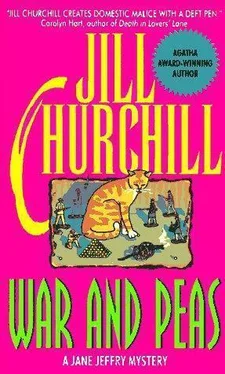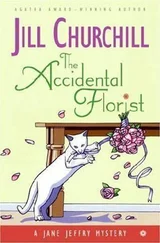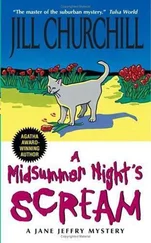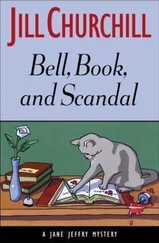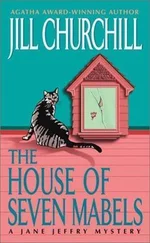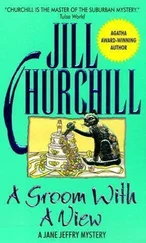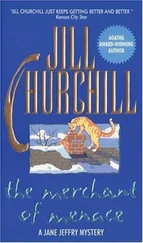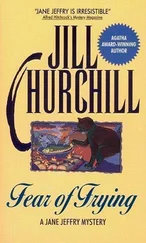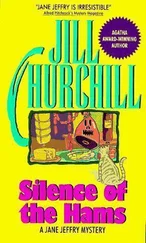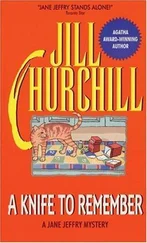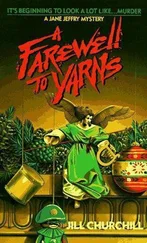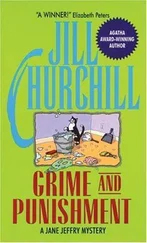Jill Churchill
War and Peas

One
1863—Sort of
Jane Jeffry shifted the heavy gunnysack to her other shoulder and almost stumbled. The field was rutted and the stubble of last year's wheat crop dragged at the hem of her calico dress and poked at her legs through her prickly black wool stockings. Her feet hurt in her tightly laced shoes, but they were the only things keeping her ankles from collapsing. It was so hot. She and her friend Shelley could have walked to town along the dusty track at the edge of the field: it would have been shadier and easier walking, but there were dangers in the woods. Desperate men with hair-trigger tempers, empty bellies, and eyes and hands starved for the sight and feel of women. No, it wasn't safe to walk near the woods where soldiers — or worse, deserters-might be hiding. If only she'd worn a bonnet with a wider brim to keep the sun off her face.
There were other women making the long trek to town for supplies as well. Jane looked over her shoulder and could tell that the threesome a few yards behind was suffering, too. Their postures were wary but exhausted, and one rather plump young woman had a face as red as a beet.
Jane glanced past Shelley at the inviting shade and wished they'd thought to bring water along. "I'm thirsty," Jane complained.
“It's not much farther," Shelley said. She, too, was suffering from the heat. The ties of her bonnet were sweat-soaked and she was squinting against the bright August day. "It's too bad ladies can't go into the saloon in town. But there's that pump in front of the saddler's. We can get a drink there.”
They stumbled on for a few more feet and Shelley suddenly stopped, putting her hand out to signal Jane to listen. There was the faint sound of a bugle.
“What does that mean?" Jane asked.
“I don't know," Shelley said, "except that we'd better hurry.”
Glancing nervously at the woods on either side of the field, they hitched up their long skirts and layers of petticoats and tried to make better speed. But it was useless. Before they'd gone a few yards, they heard men shouting.
“Over there," Jane gasped, pointing to their right.
“No, the other way," Shelley countered, gesturing toward the grove of trees to their left.
Suddenly the field was overrun by soldiers: Confederate to one side of them, tearing acrossthe field; Union to the other, firing from the woods. The bloodcurdling sound of rebel yells laced through the sharp cracks of gunfire and the screams of the women trying to flee for safety. But there was no escape. They were surrounded, trapped between two clashing armies. A Confederate soldier with a sword dashed past them and part of Jane's brain registered how tattered and sad, yet fanatic, he looked with his patched uniform, untrimmed beard, and flashing eyes. Jane felt her throat closing from the hot, acrid scent of gunpowder. She dropped her heavy pack — it was the tomatoes she'd grown to trade for flour for the winter.
“Here! This way," Shelley shouted above the noise. Dying men were screaming with pain. A boy no more than thirteen had carried the regimental flag onto the field and was now sprawled across it facedown. They stepped over him and ran toward the town. One of the women who'd been walking behind them had somehow gotten ahead of them and had fallen, too. Her straw hat with the sun-faded cloth cabbage roses was twisted around, concealing her face.
Shelley fell in a rut and almost went down on her knees, but Jane grabbed her by the arm and dragged her forward. They had to keep their eyes on the ground to stop from falling again.
Jane looked up just in time to prevent them from running right into a crowd of people wearing shorts and tank tops, and sitting on aluminum lawn chairs.
They were applauding.
Shelley skidded to a stop, looked down at her arms, which were scratched and dirty. "It's going to take a week at Elizabeth Arden to get over this," she said.
According to the brochure that was being handed out after the reenactment, Auguste Caspar Snellen had come from Alsace-Lorraine to the Chicago area as an ambitious boy of twenty in 1875. Just north of the city, he'd claimed a large parcel of land that turned out to be one of those microclimates that were sensational for growing peas. He'd tried potatoes first, but they rotted. Rutabagas grew well, but nobody wanted them. Corn withered on the stalk. But when he tried his hands at peas, they flourished as if by magic. Being of an amateur scientific bent, Auguste started importing other varieties of peas. They turned to gold. Rather than selling the peas as food, he sold them as seed all over the country. He built a little laboratory and greenhouse and developed new strains. By the time he was fifty, Auguste Snellen was the "Pea King" and a very wealthy man.
In 1907, he used some of his wealth to endow a museum, which was named for him. He'd originally wanted the museum to be filled solely with exhibits having to do with the history and significance of peas, which he found endlessly fascinating, but he was finally persuaded that other agricultural (and eventually domestic) pursuits were also fit subjects for museum exhibits.
Auguste Snellen was responsible for the county's Pea Festival, which had taken place every August (no coincidence, that) since 1927—except in 1945, when everybody was too busy celebrating the end of the war; and in 1964, when a tornado ripped through the fairgrounds the afternoon before the opening of the festival and scattered jellies, afghans, flower exhibits, farm implements, and a few startled piglets far and wide.
The Snellen Museum always had a "presence" at the Pea Festival, but for years it was usually a single booth with a few dusty artifacts and boring hand-labeled signs inviting people to visit the museum to see more of the same. But ten years earlier, there had been a change. The booth was enlarged, and the exhibits grew more interesting and more professionally presented. This was because of Regina Price Palmer, the then very young woman who had been appointed director of the Snellen Museum, and Lisa Quigley, the publicity director Regina had urged the board to hire.
The women were a perfect pair, united in their vision of the Snellen's future. And this year the Snellen Museum, under their guidance, had promoted itself in a big way at the Pea Festival. They'd rented a huge tent, put together a truly impressive exhibit, including a real sod house, and done an enormous amount of advance advertising for the Civil War reenactments they were sponsoring ("BE A PART OF YOUR OWN HISTORY-EVERY DAY AT 10 A.M. AND 2 P.M.").
Jane fanned herself with the brochure and looked longingly at an empty lawn chair in a shady spot under a maple tree near the edge of the field. Surely its owner wouldn't mind letting a hot, sweaty, itchy reenactor sit down for a minute or two. If she snagged the empty chair, however, she wouldn't be able to go find a cold drink, but if she went for a drink first, the lawn chair might become occupied. Funny how her brain didn't quite work in the heat. How on earth had women survived summer in this kind of garb?
“Jane, that was great," Mel VanDyne said from behind her.
“Oh, Mel! Thank God! I can sit down. Would you please, please get me something cold to drink? And maybe a bucket of ice water to slosh over me while you're at it?”
She flung herself into the chair and watched as he walked away. Mel was her "significant other" (a term she'd reluctantly adopted because her teenage daughter, Katie, thought it was inappropriate for a mother to have a "boyfriend"). He was also a detective, but at the moment, he was merely the object of all her gratitude. While she waited, trying not to pant, she glanced around for Shelley, who had disappeared and was probably hiding from her. And well she should. Shelley had volunteered the two of them, not only for the reenactment, but for a couple weeks' worth of time at the museum.
Читать дальше
